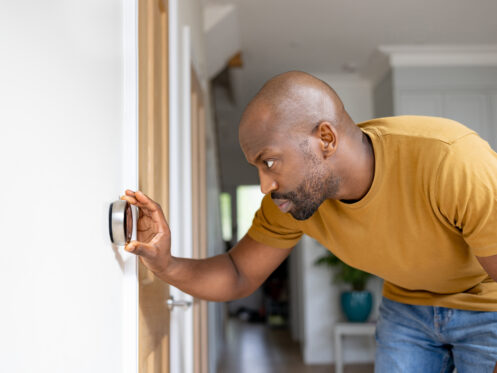Installing a heat pump in your Beckley, WV home is an excellent way to reduce your carbon footprint, lower your home energy bills, and boost your indoor air quality (IAQ). Heat pumps provide reliable, year-round temperature and humidity control. However, to enjoy these benefits and more, you must practice proper heat pump maintenance. Read on to discover all that heat pump maintenance entails.
Regular HVAC Air Filter Changes
All HVAC equipment requires regular air filter changes. Your heat pump heats and cools your indoor air by drawing it in and moving it over its refrigerant-filled coils. As air enters your HVAC system, it passes through your air filter. This component sieves out dust, dander, and other particulate matter to protect your heat pump’s interior components and your IAQ.
When buildups of filter debris become too thick and heavy, airflow declines. This causes heat pumps to overwork and can lead to problems like short cycling, icing, and overheating. If you consistently fail to check and change your air filter at regular intervals, you’ll have higher-than-normal energy bills, and your heat pump will have a shorter-than-average life span.
According to the U.S. Department of Energy (DOE), you should replace your heat pump’s air filter every three months or sooner. Most HVAC companies and HVAC equipment manufacturers recommend inspecting this component every 30 days and replacing it every 30 to 90 days.
How to Inspect and Change Your Heat Pump’s Air Filter
HVAC air filters are found in indoor air handlers or in ceiling, wall, or floor-mounted return ducts. Simply pull your filter out and hold it up to the overhead light. In theory, when light can still pass through a filter’s mesh, air can pass through it, too.
Other signs that it’s time for an HVAC air filter replacement include:
- A noticeable decline in indoor air quality
- Rising humidity
- Poor heat pump performance
- Longer and less effective heating and cooling cycles
To make staying on top of air filter maintenance easy, purchase several replacement air filters and keep them on hand.
Keep Your Air Registers, Vents, and Grilles Clean and Open
All of the conditioned air that your heat pump produces is distributed via your HVAC system’s air registers, vents, or grilles. If these features are ever dirty, blocked, or closed, your heat pump could short cycle or overheat.
When checking and changing your air filter, take the time to inspect the air vents throughout your home. Look for buildups of blown-off filter debris. If you’ve skipped or delayed air filter changes in the past, you’ll find these lint-like accumulations on and just behind your air vent covers. You can wipe these off with a soft, damp cloth. You can additionally unscrew your air vent covers and carefully vacuum behind them using your vacuum cleaner’s attachments.
Why Correcting Air Vent Closures Is Important
If you have a standard central HVAC system, your heat pump heats and cools your entire home uniformly based on the temperature reading of a single, centrally located thermostat. Unfortunately, this means that your heat pump might supply heated or cooled air even when some people are already comfortable. To customize temperatures in their immediate areas, you might have one or more family members who close nearby air vents.
Vent closures route conditioned air away from rooms. However, this air has nowhere to go. Rather than moving to other occupied spaces, it builds up in air ducts and causes a dramatic increase in static pressure. As a result, a single vent closure can affect airflow throughout your entire HVAC system.
When checking and cleaning air vents, open those that are fully or partially closed. To optimize airflow and air delivery, you can also schedule professional air balancing services as needed.
Maintain the Perimeter of Your Outdoor Condenser Unit
Your heat pump’s outdoor condenser unit contains its compressor, blower motor, and blower fan. This is also where your heat pump sheds heat during cooling cycles. As per the DOE, you’ll need to keep this unit’s perimeter clear to ensure good airflow and optimum efficiency. At minimum, heat pump condensers should have 24 inches of clearance on all sides. However, some models require at least 3 feet of clearance instead.
Every one to two months, check your outdoor condenser and cut back all nearby:
- Grass
- Shrubs
- Tree branches
- Weeds
- Flowering plants
You should also remove all loose, windblown debris and check for signs of pest infestation.
Schedule Professional Heat Pump Tune-Up Service
Apart from changing your air filter, maintaining your HVAC air vents, and cleaning the perimeter of your condenser unit, most of your heat pump maintenance should be handled by a licensed HVAC company. Scheduling regular, professional heat pump tune-ups is essential for remaining compliant with your heat pump manufacturer’s warranty.
What Does a Professional Heat Pump Tune-Up Include?
During professional heat pump maintenance, our technicians perform comprehensive, multi-point inspections. We:
- Test airflow
- Inspect all electrical connections
- Measure refrigerant levels
- Inspect and optimize blower fan speeds
We also clean all indoor and outdoor components, including heat pump evaporator and condenser coils, condensate drain lines, and air handling units. These visits give us the chance to tighten loose bearings, lubricate moving parts, and replace damaged or worn components.
Heat pump tune-ups are also an opportunity for our team to test and calibrate your thermostat and optimize its location. As the brains of your heat pump’s operations, your thermostat must be able to read your indoor temperature accurately. We make sure that thermostats aren’t too close to heat-generating appliances or installed in drafty locations.
How Often Should You Schedule a Professional Tune-Up?
Air conditioners and furnaces require professional tune-up service once each year. When homeowners use heat pumps solely for summertime cooling, these appliances need annual tune-up service as well. However, if you use your heat pump for both heating and cooling, you should have it tuned up before summer and again before winter arrives.
Take Care of Your Ductwork
Another important part of maintaining your heat pump is taking care of your HVAC ductwork. When testing airflow during professional tune-up service, we’ll look for air leaks and other duct-related problems in visible areas. It’s also important to schedule comprehensive air duct maintenance at least once each year.
HVAC Air Duct Sealing and Cleaning
You can prevent air loss, conserve energy, and extend the life span of both your air ducts and your heat pump by having your ductwork professionally sealed and insulated. As per the National Air Duct Cleaners Association (NADCA), it’s also best to have your HVAC air ducts cleaned every three to five years.
Common signs that you need air duct cleaning now include:
- Visible airborne particulates
- In-duct pest infestations
- Foul odors during HVAC operation
- Abnormally short HVAC air filter life spans
Cleaning air ducts improves airflow, freshens the indoor air, and improves IAQ by eliminating trapped contaminants.
We help homeowners in Beckley optimize their home comfort and save money with expert HVAC, heating, cooling, electrical, and plumbing services. We also provide home energy audits, advanced indoor air quality improvements, and leak detection services. To find out about our HVAC preventative maintenance plan or schedule a heat pump tune-up, get in touch with Childers Air Plumbing & Electric now.

